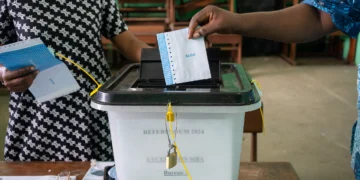The Interim Administrator of the Presidential Amnesty Programme (PAP), Maj. Gen. Barry Ndiomu (Rtd) on Monday met with representatives of registered PAP vendors, who have completed the six months training for the Programme.
A statement made available by Freston Akpor, SA Media to the Interim Administrator, said the forum which held at the PAP Conference Room, provided an opportunity for management and the vendors to rub minds on several issues.
Speaking, Gen. Ndiomu expressed his appreciation to the vendors for doing a good job in effectively building the capacity and skills of delegates for employability.

He also commended them for cooperating with the PAP’s renegotiation of the terms of their contracts, a gesture which helped the Office in addressing several outstanding issues.
The Interim Administrator said the PAP was glad with the level of capacity displayed by the vendors in the completion of the project phase.
According to him, the Office will now focus on creative ways of resettling delegates through empowerment programs to promote and use the skills and knowledge acquired to add value to the socio-economic growth of the Niger Delta.
General Ndiomu explained that, “the aim of this alliance is to train, empower, redeploy and exit the delegates from the Programme, which is the initial aim and objective of the PAP”.
“I am in talks with several organizations like NEXIM about setting up a co-operative that will help promote and engage the delegates in their various fields of learning; something more sustainable that will outlive the PAP”, he stated.
In their separate remarks, all seven vendors expressed gratitude to the PAP for the opportunity to enable them to contribute towards developing human capacity in the Niger Delta region.
They also applauded the Interim Administrator and the management of PAP for the symbiotic relationship that existed throughout the duration of the six-month training programme.
They called for a process to screen delegates for future training programmes as well as strengthening the existing monitoring and evaluation methods to reap the needed values from such capacity-building efforts.





































